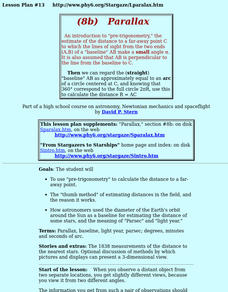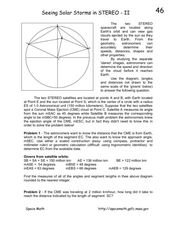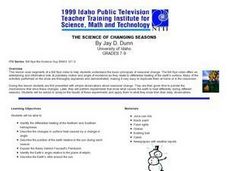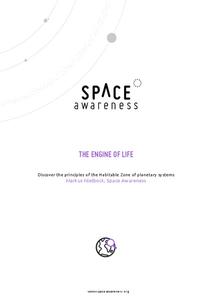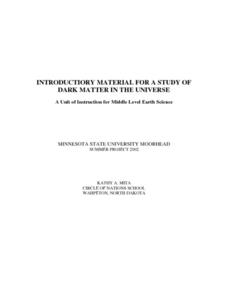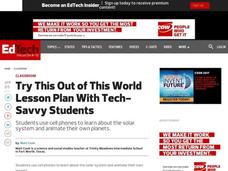Curated OER
Parallax
Students discover how astronomers used the diameter of the Earth's orbit around the Sun as a baseline for estimating the distance of some stars, and the meaning of "Parsec" and "light year."
Curated OER
Our Solar System
In this solar system worksheet, students complete a database comparing the 9 different planets' mass, surface temperature, rotation period, orbital period, moons, and distinguishing features. This worksheet is a graphic organizer.
Curated OER
Astronomy and Me: Moons Over New Haven
Third graders study the features of different moons orbiting the planets. In this astronomy lesson, 3rd graders explore the different phases of the moon using an interactive online website. They compare and contrast the features of the...
Curated OER
Fractions in Space
In this fractions in space worksheet, students solve 4 problems where they find ratios of orbit periods of satellites, they find the ratio of Neptune's and Pluto's periods, they determine the location of the planets after 5 opposition...
Curated OER
How Hot is that Planet?
In this planet worksheet, high schoolers read about finding the temperature of a planet using the distance to its star, its reflectivity and the luminosity of the star. Students use a given equation to determine the surface temperature...
Curated OER
Seeing Solar Storms in STEREO-II
In this solar storms activity, students use a diagram given the location of two STEREO spacecraft satellites, a coronal mass ejection, the sun and the Earth to solve 2 problems about the coronal mass ejection. Students use segments,...
Curated OER
An application of the Parallax Effect
For this parallax effect worksheet, students observe 2 photographs taken of an active area of the sun by 2 STEREO satellites and 1 photograph taken of the same active area of the sun by the SOHO satellite. Students observe the shift in...
Curated OER
Student Exploration: Summer and Winter
In this recognizing the seasons online/interactive worksheet, students explore the Earth's positions and determine the summer and winter season. Students answer 21 short answer questions
Curated OER
Black Holes IV
In this black holes worksheet, students read about black holes and solve 3 problems where they calculate the Schwarschild radius of one, the number of grams/second a quasar luminosity implies for another and the number of suns per year a...
Curated OER
The Changing Atmosphere of Pluto
In this atmosphere of Pluto worksheet, students use an equation for the orbit of Pluto to determine the semi-major axis, the semi-minor axis, the ellipticity of the orbit, the aphelion and the perihelion. They also determine the...
Curated OER
The Science of Changing Seasons
Students explore basic principles of seasonal change, ponder the mechanisms that drive these changes, and perform experiments that show what causes the earth to heat differently during different seasons.
Curated OER
Planets in Proportion
Students apply estimation strategies and proportional reasoning to determine a scale comparing the planetary bodies to Earth. They convert measurements of time and distance using scientific notation. Both the metric and customary units...
Space Awareness
The Engine of Life
There is a specific zone, or distance from a star, that a planet must be in order to have water in a liquid form. The activity demonstrates how flux density depends on its distance from the source. A photovoltaic cell gets power to drive...
Core Knowledge Foundation
A Time for All Seasons - Spring
Celebrate the arrival of spring with this fun primary grade science unit. Engaging young scientists with a variety of hands-on activities and inquiry-based investigations, these lessons are a great way to teach children about seasonal...
Curated OER
Dark Matter In The Universe
Students investigate the concept of dark matter and how it occurs in the universe. They conduct research using a variety of resources. Students use the information by reading at least two articles about dark matter. They also generate...
Curated OER
Gingerbread Spacecraft
Students explore the different parts of the Cassini spacecraft. For this space science lesson, students create a model of the spacecraft using food products. They compare and contrast their model with the real one and evaluate its...
Curated OER
Solar Storms
Students investigate the cycles of solar activity. They plot the solar activity and use the graph to answer a number of questions and explain the relationship between the solar storms and sunspots and the impact on earth and space travel.
Curated OER
Finding Mass in the Cosmos
In this finding mass in the cosmos worksheet, students use the equations for the force of gravity, the centrifugal force pushing a planet outwards and the speed of a planet to solve 2 problems. They find the mass of primary bodies given...
Curated OER
Gravity and the Planets
For this gravity worksheet, learners read about the solar system and the effects of the gravity of the sun, the planets and the moon on the orbits of the planets. They answer three critical thinking questions about gravity.
Curated OER
Lunar Lollipops
Students simulate the phases of the moon using a lamp and styrofoam balls. In this lunar phases lesson, students stand around a lamp and act as Earth. They hold styrofoam balls and rotate to show the phases of the moon.
Curated OER
Cut and Paste Moon Phases Activity
In this phases of the moon worksheet, students are given pictures of the phases of the moon and they cut them out and paste them to a diagram with the names of the phases. They answer questions about the moon, the phases and the rotation...
Curated OER
Out of This World
Fifth graders animate their own planets. In this solar system lesson plan, 5th graders use smartphones and the software, GoKnow Sketchy, to create images for presentations on their created planets that appear to be animated when played...
Curated OER
The Solar System
Students construct a sketch of the planets in our solar system using concentric circles and angles. In this solar system lesson plan, students plot the position of each planet on concentric circles using graph paper. The sun is included...
Curated OER
The Plasmasphere
In this plasmasphere worksheet, students read about the dilute region of gases 10,000 kilometers above the Earth where atoms are ionized. Students use a photograph taken by the IMAGE EUV instrument to answer 3 questions about the...


